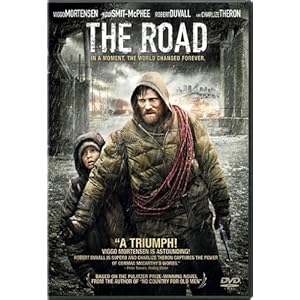Trail of Tears
On first read, 'The Road' is all ending with no beginning. The world has long since descended into madness. Nature has abdicated. Abbadon has cleaned the table and cashed in his chips. The universe has shrunk to the flickering flame of one father and his only son. Unable to separate his identity from his only remaining responsibility, The man sets off to the South and his rendezvous with oblivion. As long as he moves the long scythe cannot take its final swing. Yet he knows he must prepare his son for the inevitable, one bleeding cough at time. Their language is sparse, poetry, but only of the free verse kind. It's the visual language of full-faced tenderness that is the world's final sonnet. They profess love till there is no breath left to bear the words. We've reached the endless sea.
The movie version of 'The Road' is a rare miracle for Hollywood. Reasonably faithful to the book, it captures every viewable moment of the manuscript, and gives more voice to the inward man than I would have thought possible. John Hillcoat's direction gives us a slightly more colorful apocalypse, which is hard to imagine with such dreary cinematography, leaden horizons and carbonized skies. But the book is even more drained of light and hue. Viggo Mortensen was born to carry McCarthy's vision to ours. Kodi Smit-McPhee as the boy is a revelation and the spitting image of his screen mother, Charlize Theron. In him is the final resting place of all the man's loves and all the goodness that was lost when hope died - stolen by the woman who could not bear a future that will not bear them. It's a powerful capsule story. All the rest is horror and waste. The walking dead feed the condemned and soulless inheritors of the Lost World. Your life; their protein.
Yet it's the very loss of the last love that actually provides the boy with something he's never known and desperately desires. The father confesses: "I'm an alien from another world to you, aren't I?" The boy dreams of another little boy, someone who can inhabit his world. As the book closes, the reader's heart and vision fade to black along with the father. The movie does something astonishing by finishing the narrative exactly as written but easy to forget from the reading. Hope sustained is hope resurrected. And hope has been pursuing the boy all along.
Heart-wrenching in the truest sense.


1 comments :
I like this review a lot. I think the single-mindedness and devotion to his palette is what sets Cormac McCarthy apart from nearly every other modern author. When I read Blood Meridian, I could literally visualize the entire book as being in hues of red and black - sometimes literally, as well. He'll never utter a kind word, or use the word "pretty" or "beautiful" or any other sort of vague nicety. Likewise with the Road, which is painted entirely in grays and blacks and is equally devoted to its palette. If you judge works under the criteria Edgar Allen Poe set, which was to create a world in which every single word was inundated with the purpose of your story, then Cormac is one of the greatest authors of his time.
Post a Comment